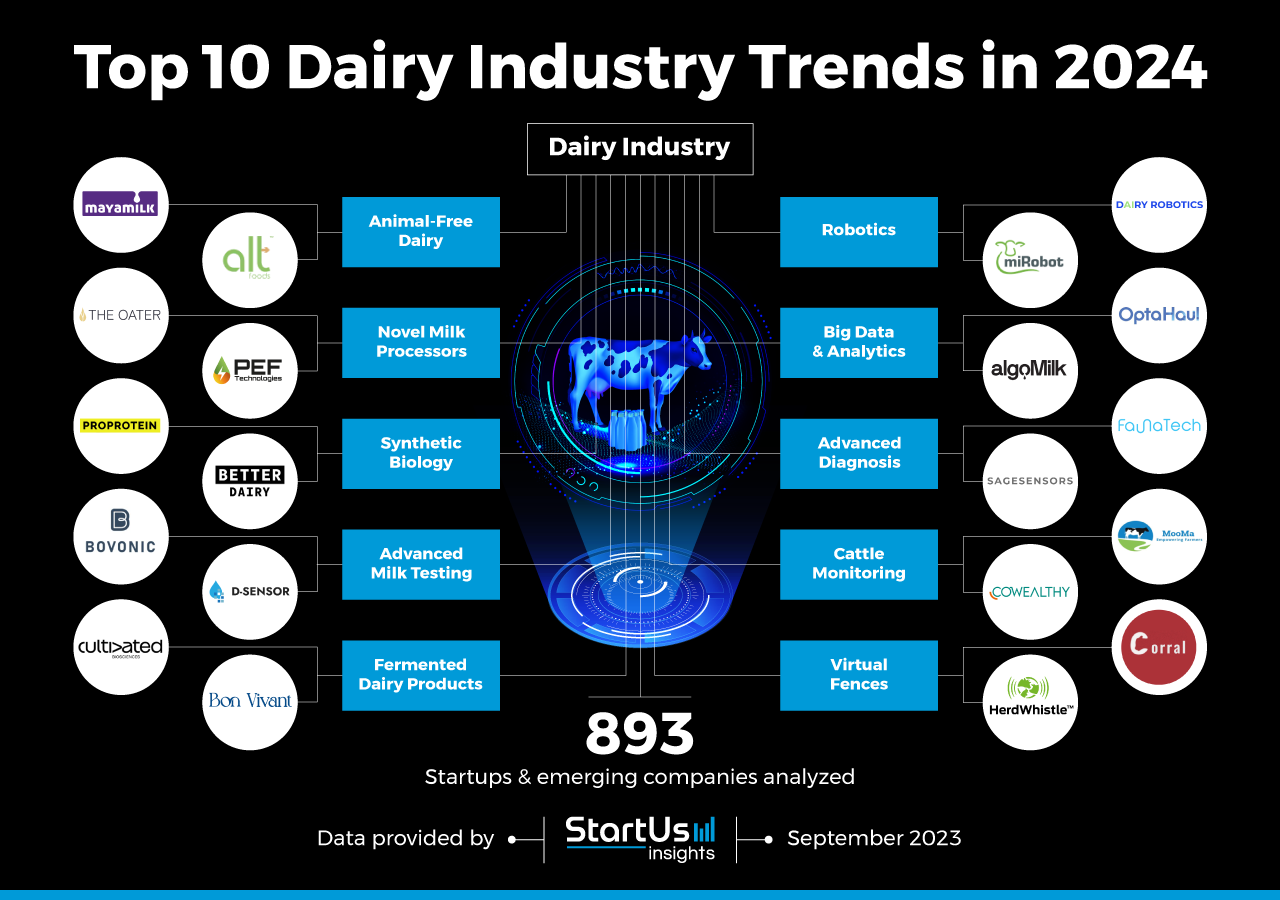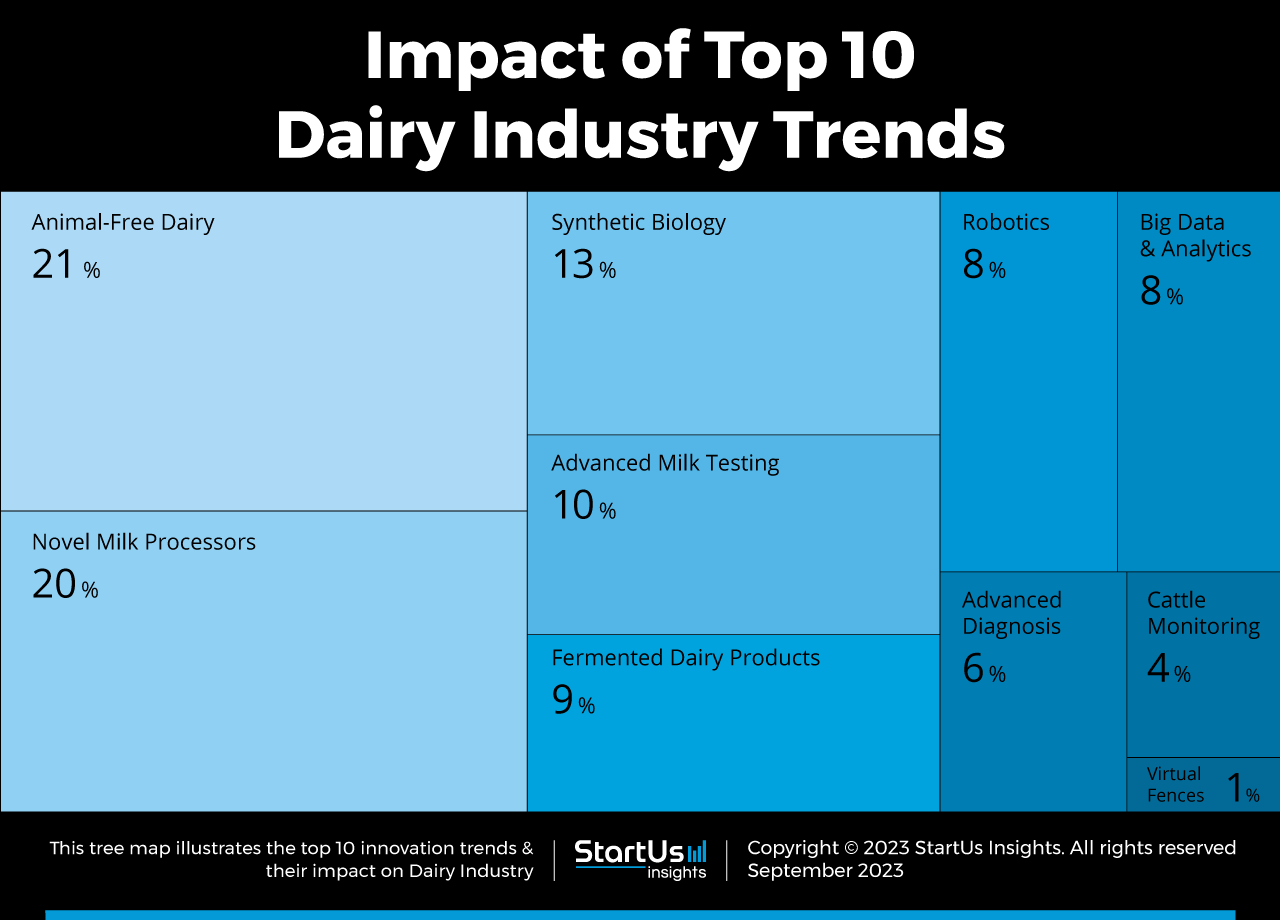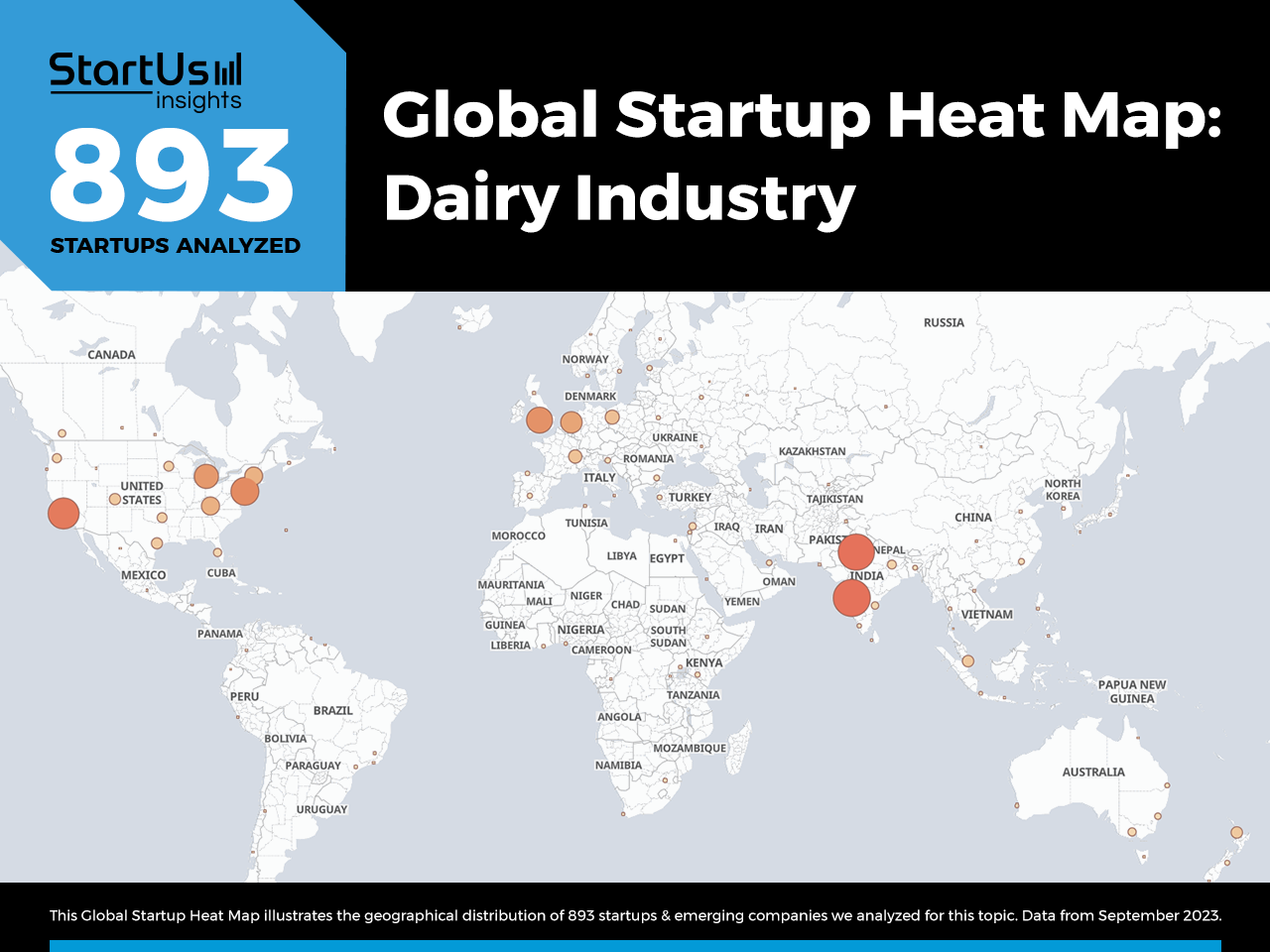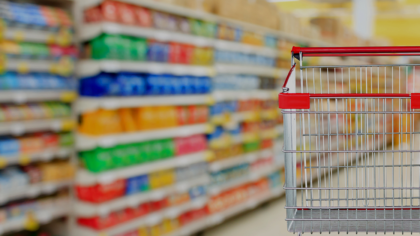The dairy industry, with roots spanning centuries, occupies a vital part of the food system. Automated milking systems once revolutionized dairy farms and now innovations in the dairy industry like robotic systems offer consistent milking schedules. When cattle experience less stress, it leads to superior milk quality. Tailoring diets to individual cows further ensures optimal health and productivity. New dairy industry trends also help in reducing water usage and greenhouse gas emissions while improving animal productivity and welfare.
Innovation Map outlines the Top Dairy Industry Trends & 20 Promising Startups
For this in-depth research on the 10 Recent Dairy Industry Trends and startups, we analyzed a sample of 893 global startups & scaleups. This data-driven research provides innovation intelligence that helps you improve strategic decision-making by giving you an overview of emerging technologies in the dairy industry. In the Dairy Innovation Map below, you get a comprehensive overview of the innovation trends & startups that impact your company.
10 Newest Trends & Innovations in the Dairy Industry (2024)
- Animal-free Dairy
- Novel Milk Processors
- Synthetic Biology
- Advanced Milk Testing
- Fermented Dairy Products
- Robotics
- Big Data & Analytics
- Advanced Diagnosis
- Cattle Monitoring
- Virtual Fences
These insights are derived by working with our Big Data & Artificial Intelligence-powered StartUs Insights Discovery Platform, covering 3 790 000+ startups & scaleups globally. As the world’s largest resource for data on emerging companies, the SaaS platform enables you to identify relevant technologies and industry trends quickly & exhaustively.
Tree Map reveals the Impact of the Top 10 Dairy Industry Trends in 2024
Based on the Dairy Industry Innovation Map, the TreeMap below illustrates the impact of the Top 10 Dairy Industry Trends in 2024. Startups and scaleups are developing animal-free dairy, which focuses on producing milk proteins without the direct involvement of animals. Parallelly, synthetic biology enables the engineering of organisms to produce essential dairy components, such as casein or whey.
The technology adoption extends to big data and analytics as well, where vast amounts of data are analyzed to optimize operations, predict yields, and streamline supply chains. Cattle monitoring systems that track cattle behavior, movement, and productivity in real time are empowering farmers. The concept of virtual fences is redefining cattle grazing, allowing them to roam within designated areas to prevent overgrazing and ecosystem degradation.
Global Startup Heat Map covers 893 Dairy Startups & Scaleups
The Global Startup Heat Map below highlights the global distribution of the 893 exemplary startups & scaleups that we analyzed for this research. Created through the StartUs Insights Discovery Platform, the Heat Map reveals high startup activity in India, followed by the US and Europe.
Below, you get to meet 20 out of these 850+ promising startups & scaleups as well as the solutions they develop. These innovative dairy companies are hand-picked based on criteria such as founding year, location, funding raised & more. Depending on your specific needs, your top picks might look entirely different.
Interested to explore all 850+ dairy startups & solutions?
Top 10 New Trends in the Dairy Industry (2024)
1. Animal-free Dairy
Animal-free dairy utilizes biotechnology to replicate the complex processes that occur within a cow’s body, thus creating dairy products without the need for traditional animal farming. Instead of sourcing milk from cows, animal-free dairy involves cultivating and manipulating cells that are naturally capable of producing milk. Some examples include microbe and millet-based animal-free dairy products.
These cells are carefully selected and nurtured in a controlled environment, fostering their ability to generate genuine dairy proteins and fats. The synthesized components are then harvested and combined to craft a range of dairy products that mirror the taste, texture, and nutritional profile of conventional dairy items. Emerging companies in this dominant dairy industry trend bridge the profile gap between alternatives and natural cattle milk.
Mayamilk works on Microbe-based Milk Production
Turkish startup Mayamilk is working with yeast cultures to produce alternative proteins. The company employs precision fermentation technology to manufacture proteins similar to dairy proteins on a large scale. The startup employs industry-scale fermentors to brew proteins from tailored yeast cultures. The produced alternative proteins are devoid of antibiotics, hormones, and allergens. This proprietary fermentation process by Mayamilk ensures sustainability and minimizes environmental impact as it reduces land, water, and animal usage.
Better Bet provides Millet-based Milk
Indian startup Better Bet offers a plant-based drink derived from sprouted millets. The drink is devoid of lactose, dairy, cholesterol, added sugar, and artificial preservatives, and offers a holistic nutrition profile. The startup’s plant-based drink is fortified with essential vitamins A, B & D, and is lower in calories and fat. The company chooses ingredients from climate-resilient crops that require minimal water, enabling cruelty-free and sustainable alternatives to milk.
2. Novel Milk Processors
Unlike conventional methods, which often rely on labor-intensive and resource-heavy practices, novel milk processors integrate automation and data-driven insights. This integration streamlines various stages of milk production, from sourcing raw materials to packaging finished products. Automation also ensures precision and consistency while reducing human error, leading to higher production quality and lower wastage.
Further, novel milk processors cater to evolving consumer preferences. They produce a diverse range of milk products tailored to specific dietary needs, such as lactose-free or plant-based alternatives. This customization enhances market competitiveness and addresses the increasing demand for specialized products.
Oater develops an Oat Milk Brewing Machine
German startup Oater develops The Oater Oat Drink Machine. This machine produces oat drinks with barista quality and freshness without the requirement for packaging or added sugar. The startup’s machine only requires the addition of the ingredient mix and uses a low-temperature fermentation process to make the drink. The startup’s machine promotes on-site and fresh plant-based milk production. Oater’s innovation significantly reduces packaging waste and transportation emissions.
PEF Technologies provides Advanced Food Preservation Technology
Dutch startup PEF Technologies builds a versatile nanoPEF machine designed for the preservation of various liquid foods. The startup’s proprietary low-temperature food preservation technology utilizes nanosecond pulsed electric fields to inactivate spoilage micro-organisms.
This system is capable of processing any homogeneous liquid, with processing capacities ranging from 500 l/h to 10,000 l/h. The machine enables the inactivation of optimal bacteria at processing temperatures below 65°C. This ensures the quality and safety of products including milk and juice-based products.
3. Synthetic Biology
Synthetic biology enables scientists to manipulate microorganisms at a genetic level to produce milk components, such as proteins and fats, without relying on traditional animal farming. Through genetic modification and precision engineering, microorganisms like yeast and bacteria are modified to mimic the complex processes found in cows’ bodies, resulting in the creation of genuine dairy components.
This innovation streamlines milk production by circumventing the resource-intensive aspects of traditional methods. It contributes to resource conservation, reduces environmental impact, and offers a more sustainable way to meet the growing demand for dairy products. Additionally, synthetic biology facilitates the creation of specialized milk variants, catering to specific dietary needs and preferences, thus expanding product offerings.
Synthetic biology also plays a role in developing enzymes for cheese-making, improving milk fermentation processes, and enhancing product consistency.
ProProtein produces Yeast-based Casein
Estonian female-led startup ProProtein focuses on sustainable dairy alternatives. The startup uses a synthetic biology approach to produce dairy proteins like casein through fermentation. ProProtein utilizes yeast for fermentation, eliminating the need for cattle farming. The startup works to optimize a yeast strain to enhance performance and purification at a laboratory scale. ProProtein’s technology promotes animal-free cheese, yogurt, and other dairy products.
Better Dairy develops a Precision Fermentation Process
UK-based startup Better Dairy offers a precision fermentation process. The company’s primary focus is on casein, a complex milk protein essential for cheese-making. The startup adds plant-based fats, sugar, and minerals to animal-free casein to make cheese. Better Dairy uses synthetic biology and yeast fermentation to produce dairy products that are molecularly identical to traditional dairy. The startup offers alternative cheese, yogurts, ice creams, and other products.
4. Advanced Milk Testing
Advanced milk testing includes techniques for analyzing milk composition and quality. This approach uses modern instruments like spectroscopy and chromatography to delve into milk’s components at a molecular level. This yields detailed information about fats, proteins, sugars, minerals, and potential contaminants. Increasing consumer awareness about milk quality is also fueling this dairy industry trend.
Moreover, advanced milk testing contributes to supply chain transparency. Identifying the origin and characteristics of milk helps trace the source of raw materials, prevent adulteration, and safeguard against fraudulent practices. Precise compositional analysis techniques further optimize processing methods, minimize waste, and enhance resource efficiency, aligning with eco-friendly practices.
Bovonic enables Early Cattle Disease Diagnosis
New Zealand-based startup Bovonic offers a cattle disease detection solution. The startup’s QuadSense is an automated solution designed to detect mastitis in dairy cattle. Bovonic’s patented milk sensor combined with its proprietary detection algorithm enables the identification of mastitis in the earliest stages, allowing for timely intervention.
Bovonic’s QuadSense is also an automated process, eliminating the need for labor-intensive manual inspections such as herd stripping or the California Mastitis Test (CMT). It is a cost-effective solution to manage and mitigate the impacts of mastitis on their herds.
D-Sensor aids Detection of Antibiotic Residues in Milk
Polish startup D-Sensor designs a solution to detect antibiotic residues in milk. The startup’s proprietary technology is automated and delivers real-time results during the milking process without requiring human intervention. It utilizes non-linear chemistry, machine learning, and blockchain technology to develop the solution. The startup’s solution recognizes 21 molecules and detects four types of antibiotics: beta-lactam, tetracycline, chloramphenicol, and streptomycin in milk. This improves the quality testing of milk and also ensures an informed consumer experience.
5. Fermented Dairy Products
The process of fermentation contributes to improved digestibility by breaking down complex milk constituents, providing a more easily digestible option, particularly valuable for individuals with lactose sensitivity. Additionally, the influence of microbial activity enriches products with unique flavor profiles and creamy consistencies. For instance, the distinctive tangy taste and smooth texture of yogurt are outcomes directly linked to the fermentation process.
Further, fermentation acts as a natural preservation method. The creation of an acidic environment serves as a preservative that prolongs shelf life by inhibiting the proliferation of detrimental bacteria, effectively extending the freshness of these products. The presence of increased B vitamins and beneficial probiotics not only enhances the products’ nutritional profiles but also promotes digestive health and balance.
Cultivated Biosciences cultures Yeast Strains
Swiss startup Cultivated Biosciences produces yeast-based ingredients for the plant-based food industry. The startup develops oleaginous yeast that offers the creaminess and texture required for plant-based dairy products. Cultivated Biosciences’ products are enriched with the beneficial microbes in the fermentation process. The products also have a clean label with comparable color and emulsification properties to conventional dairy.
Bon Vivant creates Specialized Milk Proteins
French startup Bon Vivant focuses on producing milk proteins as an alternative to traditional dairy products. The startup develops yeasts that produce milk proteins, which are identical to those produced by cows. Bon Vivant employs precision fermentation to produce milk proteins. This method involves cultivating these proteins in a vegetable culture medium, allowing them to ferment. The startup’s production process is environmentally friendly and mimics the taste and texture of milk without the associated environmental impact.

6. Robotics
Robots are employed for diverse tasks within the dairy sector. They automate tasks such as milking, feeding, cleaning, and even monitoring cow health. This automation streamlines operations, ensuring consistent and accurate execution while reducing the need for manual labor. Moreover, robotic systems operate continuously, optimizing production around the clock without compromising quality or performance.
Robotics also contributes to data collection and analysis. Sensors and cameras mounted on robots provide real-time insights into cow behavior, health, and milk production. This data-driven approach enhances decision-making, enabling prompt interventions and improved management practices. Further, automated feeding systems ensure that cows receive the right amount of nutrition, contributing to their overall well-being.
Dairy Robotics develops a Robotic Milking System
Irish startup Dairy Robotics advances the milking sector through its robotic milking system. The startup’s milking system utilizes AI for enhanced animal health monitoring. It offers udder identification, which ensures precise cup attachment, thereby optimizing the milking process.
The system monitors changes in milk output for each animal and uses deep learning to automatically gather, label images, and redeploy its model. This ensures optimized robot path planning and efficient milking. The proprietary AI integration not only ensures better cup attachments but also actively monitors animal health.
miRobot builds a Robot for Automated Milking
Israeli startup miRobot offers a robotic solution designed to fully automate the milking routine. The startup’s system integrates with existing dairy farm infrastructures and management systems. It employs 3D imaging to guide the milking and cleaning cups precisely to the cow’s teats, and gentle attachment.
The system’s unique disinfecting process uses a specialized cup that mimics the human hand, stimulating the teats. It also delivers a combination of air, liquid, and disinfectant for optimal cleaning and preparation. miRobot’s robotic arms are designed to be lightweight, flexible, and durable while being gentle to the cows.
7. Big Data & Analytics
Big data collates the vast volume of information generated by dairy operations, spanning from cow health metrics and milk production records to environmental factors and market trends. This unveils patterns, correlations, and trends that might otherwise remain hidden, empowering stakeholders to make well-informed decisions.
The role of big data and analytics extends across the entire dairy supply chain. From farm management to production processes and distribution, data-driven insights guide optimization efforts, enhancing resource allocation, reducing waste, and improving overall operational efficiency.
For example, through historical data patterns and real-time inputs, analytics solutions forecast cow health issues, milk production trends, and even market demand. This proactive approach aids in preventive measures, better planning, and adapting to changing consumer preferences.
OptaHaul offers Route Optimization Software for Dairy
Irish startup OptaHaul provides specialized route optimization software tailored for the dairy industry, focusing on farm-to-plant milk transport. OptaHaul’s software uses its advanced mathematical algorithm to process and analyze various data points and calculate the most cost-effective route plans.
The software analyzes parameters such as local conditions, access restrictions, and the specific needs of dairy processors, cooperatives, and milk haulers. The result is optimal route plans that not only reduce haulage costs but also minimize greenhouse gas (GHG) emissions.
algoMilk enables Predictive Farm Analytics
Spanish startup algoMilk optimizes dairy farm operations through predictive analytics and data-driven insights. The startup offers hardware-based automated milking solutions to cattle farmers. algoMilk provides smart assistance for the target level of milk production, how to group cows, the purchasing price for a given feed, and how to react to market changes and milk demand. The startup’s platform utilizes advanced deep-learning algorithms to forecast animal performance and optimize various targets.
8. Advanced Diagnosis
Advanced diagnosis encompasses a range of technologies, including imaging techniques, molecular diagnostics, and wearable sensors. These methods enable veterinarians and dairy professionals to detect health issues and anomalies in animals with heightened precision. By analyzing biological samples and real-time data, practitioners gain insights into factors such as disease prevalence, reproductive health, and overall well-being.
The significance of advanced diagnosis extends to both individual animals and the herd. Timely detection of health issues allows for proactive interventions, reducing the risk of disease spread and minimizing economic losses.
Further, the integration of wearable sensors provides continuous monitoring, enabling early detection of subtle changes in behavior, vital signs, and overall health status. This approach also enhances animal welfare by minimizing unnecessary treatments and reducing stress associated with repeated interventions.
FaunaTech designs Handheld Devices for Blood Diagnostics
Indian startup FaunaTech provides milk analysis with its proprietary platform, Fauna, to bring the precision of blood diagnostics to the dairy sector. FaunaTech’s handheld device employs proprietary optics and spectral techniques to instantaneously measure over ten key parameters from raw milk.
These parameters include somatic cell count (indicative of mastitis), fat content, antibiotic residue, and Beta-Hydroxy-Butyrate (BHB), among others. The platform’s real-time insights are beneficial for dairy producers and veterinarians, offering a comprehensive view of herd health. FaunaTech enables precision dairy farming, facilitating evidence-based decision-making that benefits both the animal and the farmer.
SageSensors builds Hydrogel-based Implantable Sensors
US-based startup SageSensors develops an implantable sensor and measurement system to digitally monitor the health of feed animals. The startup’s sensor platform is capable of invasively measuring health biomarkers, including temperature, oxygen, glucose, pregnancy hormones, and lactate. The sensor is a luminescent hydrogel implant that is placed just beneath the animal’s hide. SageSensors’ technology offers a more proactive approach to animal health, potentially predicting illnesses days before traditional methods would detect them. The startup’s early detection leads to reduced use of antibiotics and medications in feed animals.
9. Cattle Monitoring
Comprising a spectrum of technologies such as wearable sensors, RFID tags, and automated data collection, cattle monitoring empowers dairy professionals to track individual and herd-wide data in real-time. This data encompasses aspects like health metrics, feeding patterns, reproductive status, and overall behavior.
The implications of cattle monitoring span multiple facets. Swift identification of health irregularities allows for prompt interventions, minimizing the risk of disease spread and optimizing animal welfare.
Beyond the confines of the farm, cattle monitoring aligns with transparency demands from consumers. This technology allows stakeholders to trace the journey of dairy products back to their source, bolstering accountability and trust in the dairy supply chain.
MooMa employs AI for Continuous Farm Monitoring
Singapore-based startup MooMa builds MaaTek, an end-to-end solution for continuous monitoring across various domains, facilitating automated milk collection and daily milk production tracking. The startup employs AI to provide dairy farmers with timely alerts regarding changes in their herd. The system also alleviates concerns related to machinery, cow health, and milk quality, allowing farmers to focus on effective farm management.
MaaTek offers timely predictions of the estrous cycle, enhancing milk yields. It also facilitates early detection of illnesses such as foot-mouth disease and mastitis, ensuring timely veterinary intervention. The system provides insights into environmental conditions, ensuring optimal care for the cattle.
Cowealthy provides an IoT-based Farm Social Network
US-based startup Cowealthy develops a platform that functions as a social network for farm animals. Cowealthy’s wireless IoT system captures accurate, real-time data from animals and their environment. This data is then processed through an AI-based analytics platform that employs artificial intelligence to generate insights. These insights aid farmers and supply chains in making better-informed decisions. Cowealthy’s solution analyzes real-time animal and environmental data and actionable insights to optimize its operations for better performance, and animal welfare.
10. Virtual Fences
Virtual fences utilize a combination of GPS, sensors, and software algorithms to establish invisible boundaries for cattle. These boundaries are demarcated through signals that prompt cattle to alter their path, effectively guiding them without the need for physical structures. This technology offers dairy professionals a means to manage grazing patterns, control movement, and optimize pasture usage.
The implications of virtual fences are multifold. They enable livestock to be directed to desired grazing areas, preventing overgrazing and promoting balanced land utilization. This not only benefits pasture health but also contributes to more sustainable farming practices. Moreover, virtual fences reduce the reliance on traditional fencing materials, minimizing environmental impact and resource consumption.
Corral Technologies develops Advanced Cow-Calf Fences
Turkish startup Corral Technologies develops a virtual fence system for cow-calf operations. The startup’s Corral collar system offers a suite of features that allows ranchers to track their cows in real-time, ensuring they are always where they are supposed to be. The advanced system also allows users to create new cross fences on any pasture using multiple devices, optimizing pasture utilization. Corral Technologies has the ability to move cows remotely, saving ranchers valuable time.
HerdWhistle Technologies offers GPS-enabled Cattle Collars
Canadian startup HerdWhistle Technologies offers CattleShield, a virtual fence system designed to keep cattle within a user-defined grazing area without the need for physical barriers. The startup’s virtual fence system employs a GPS-enabled collar that continuously tracks cattle as they graze. CattleShield’s collar uses a sequence of vibrations, sounds, and stimuli to deter them from crossing the boundary.
The virtual fence ensures efficient pasture utilization and prevents cattle from accessing and potentially damaging nearby assets or polluting bodies of water. Further, it’s lightweight and flexible, ensuring maximum comfort for the cattle. CattleShield offers efficient cattle management, ensuring optimal grazing while minimizing environmental impact.
Discover all Future Dairy Industry Trends, Technologies & Startups
Advanced technologies are bringing in a wave of innovations that promise to redefine dairy management, production, processing, and consumption. From predicting the optimal diet for livestock to ensuring their health and well-being, dairy companies are enhancing farm productivity. IoT further enables the monitoring of dairy farms to ensure optimal conditions for milk production.
The current dairy industry trends and companies outlined in this report only scratch the surface of trends that we identified during our data-driven innovation & startup scouting process. Identifying new opportunities & emerging technologies to implement into your business goes a long way in gaining a competitive advantage.











